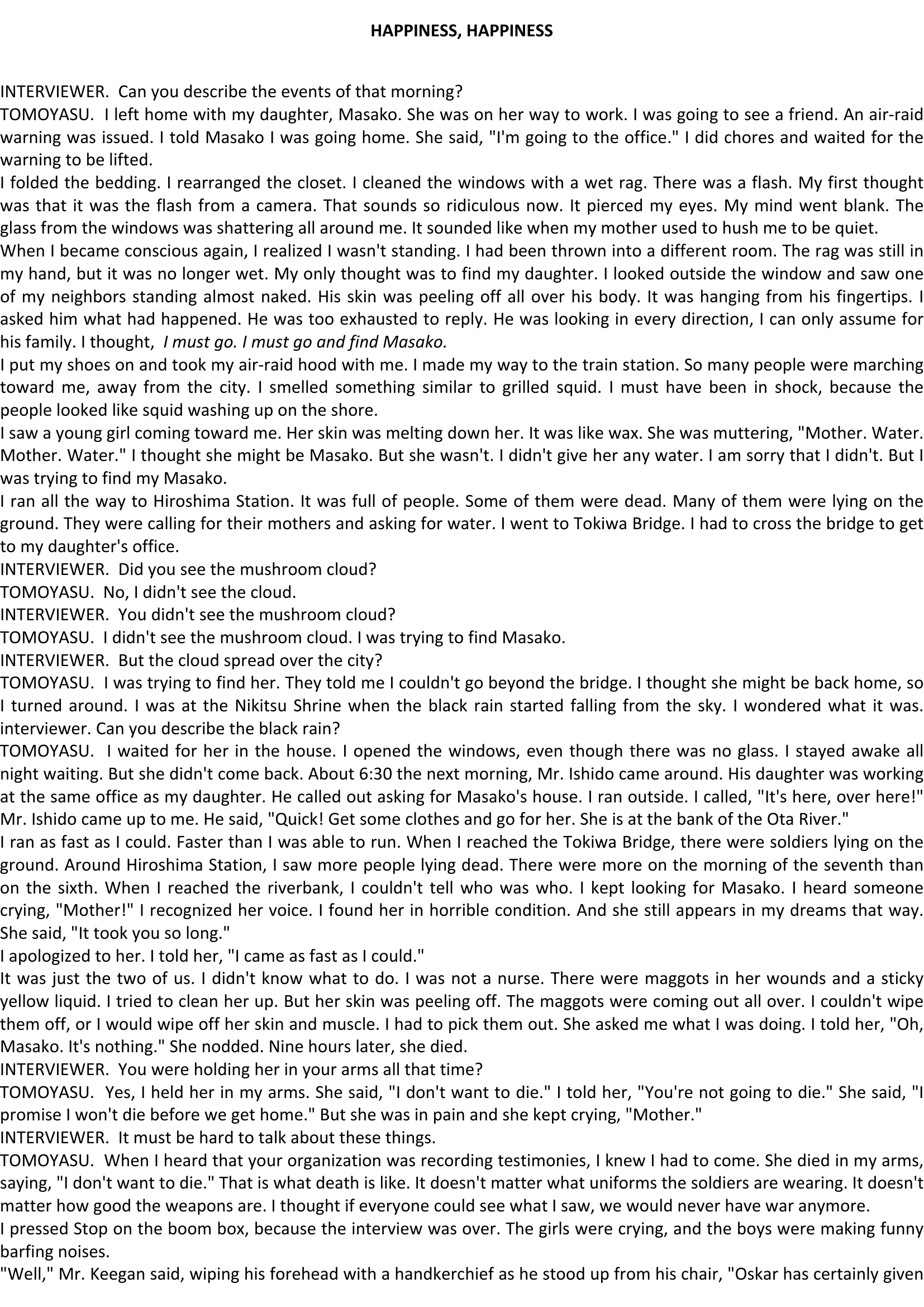I understood him.
Publié le 06/01/2014

Extrait du document
«
HAPPINESS,
HAPPINESS
INTERVIEWER.
Canyoudescribe theevents ofthat morning?
TOMOYASU.
Ileft home withmydaughter, Masako.Shewas onher way towork.
Iwas going tosee afriend.
Anair-raid
warning wasissued.
Itold Masako Iwas going home.
Shesaid, "I'mgoing tothe office." Idid chores andwaited forthe
warning tobe lifted.
I folded thebedding.
Irearranged thecloset.
Icleaned thewindows withawet rag.
There wasaflash.
Myfirst thought
was that itwas theflash from acamera.
Thatsounds soridiculous now.Itpierced myeyes.
Mymind wentblank.
The
glass from thewindows wasshattering allaround me.Itsounded likewhen mymother usedtohush metobe quiet.
When Ibecame conscious again,Irealized Iwasn't standing.
Ihad been thrown intoadifferent room.Theragwas stillin
my hand, butitwas nolonger wet.Myonly thought wastofind mydaughter.
Ilooked outside thewindow andsaw one
of my neighbors standingalmostnaked.Hisskin waspeeling offallover hisbody.
Itwas hanging fromhisfingertips.
I
asked himwhat hadhappened.
Hewas tooexhausted toreply.
Hewas looking inevery direction, Ican only assume for
his family.
Ithought, I
must go.Imust goand find Masako.
I
put myshoes onand took myair-raid hoodwithme.Imade myway tothe train station.
Somany people weremarching
toward me,away fromthecity.
Ismelled something similartogrilled squid.Imust havebeen inshock, because the
people lookedlikesquid washing upon the shore.
I saw ayoung girlcoming towardme.Herskin wasmelting downher.Itwas likewax.
Shewas muttering, "Mother.Water.
Mother.
Water."Ithought shemight beMasako.
Butshe wasn't.
Ididn't giveherany water.
Iam sorry thatIdidn't.
ButI
was trying tofind myMasako.
I ran allthe way toHiroshima Station.Itwas fullofpeople.
Someofthem weredead.
Many ofthem werelyingonthe
ground.
Theywere calling fortheir mothers andasking forwater.
Iwent toTokiwa Bridge.Ihad tocross thebridge toget
to my daughter's office.
INTERVIEWER.
Didyou seethemushroom cloud?
TOMOYASU.
No,Ididn't seethecloud.
INTERVIEWER.
Youdidn't seethemushroom cloud?
TOMOYASU.
Ididn't seethemushroom cloud.Iwas trying tofind Masako.
INTERVIEWER.
Butthecloud spread overthecity?
TOMOYASU.
Iwas trying tofind her.
They toldmeIcouldn't gobeyond thebridge.
Ithought shemight beback home, so
I turned around.
Iwas atthe Nikitsu Shrinewhentheblack rainstarted fallingfromthesky.
Iwondered whatitwas.
interviewer.
Canyoudescribe theblack rain?
TOMOYASU.
Iwaited forher inthe house.
Iopened thewindows, eventhough therewasnoglass.
Istayed awakeall
night waiting.
Butshe didn't comeback.About 6:30thenext morning, Mr.Ishido camearound.
Hisdaughter wasworking
at the same office asmy daughter.
Hecalled outasking forMasako's house.Iran outside.
Icalled, "It'shere, overhere!"
Mr.
Ishido cameuptome.
Hesaid, "Quick! Getsome clothes andgofor her.
Sheisat the bank ofthe Ota River."
I ran asfast asIcould.
Faster thanIwas able torun.
When Ireached theTokiwa Bridge,thereweresoldiers lyingonthe
ground.
AroundHiroshima Station,Isaw more people lyingdead.
There weremore onthe morning ofthe seventh than
on the sixth.
When Ireached theriverbank, Icouldn't tellwho waswho.
Ikept looking forMasako.
Iheard someone
crying, "Mother!" Irecognized hervoice.
Ifound herinhorrible condition.
Andshestill appears inmy dreams thatway.
She said, "Ittook yousolong."
I apologized toher.
Itold her, "Icame asfast asIcould."
It was justthetwo ofus.
Ididn't knowwhattodo.
Iwas notanurse.
Thereweremaggots inher wounds andasticky
yellow liquid.Itried toclean herup.But herskin waspeeling off.The maggots werecoming outallover.
Icouldn't wipe
them off,orIwould wipeoffher skin andmuscle.
Ihad topick them out.Sheasked mewhat Iwas doing.
Itold her, "Oh,
Masako.
It'snothing." Shenodded.
Ninehours later,shedied.
INTERVIEWER.
Youwere holding herinyour arms allthat time?
TOMOYASU.
Yes,Iheld herinmy arms.
Shesaid, "Idon't wanttodie." Itold her, "You're notgoing todie." Shesaid, "I
promise Iwon't diebefore weget home." Butshe was inpain andshekept crying, "Mother."
INTERVIEWER.
Itmust behard totalk about thesethings.
TOMOYASU.
WhenIheard thatyour organization wasrecording testimonies, Iknew Ihad tocome.
Shedied inmy arms,
saying, "Idon't wanttodie." Thatiswhat death islike.
Itdoesn't matterwhatuniforms thesoldiers arewearing.
Itdoesn't
matter howgood theweapons are.Ithought ifeveryone couldseewhat Isaw, wewould neverhavewaranymore.
I pressed Stoponthe boom box,because theinterview wasover.
Thegirls were crying, andtheboys were making funny
barfing noises.
"Well," Mr.Keegan said,wiping hisforehead withahandkerchief ashe stood upfrom hischair, "Oskar hascertainly given.
»
↓↓↓ APERÇU DU DOCUMENT ↓↓↓
Liens utiles
- LUI [Him]. (résumé)
- Meru (mont), dans la cosmologie indienne, montagne mythique de l'Him?laya, censée être l'axe du monde matériel.
- le 2 ED 5 Lil de PACESé rsit 2011-2012 E1 ve ni S U ie U CE him A 12 P c -20 Bio e 2011 D5
- PACES 2011-2012 ire ita ers ED4 UE1 ni v e u - 2012 E1 é Biochimie nn U A 1 01 - Glucidesie 2 him Lipides oc Bi ES AC P 8 novembre au 15 novembre 2011 1 Soit le 1-palmitoyl-2-linoléyl-3-stéaryl-glycérol : ire 1- Représentez sa structure ita ?
- Robinson Crusoe (extrait) Daniel Defoe (...) In a little time I began to speak to him, and teach him to speak to me; and, first, I made him know his name should be Friday, which was the day I saved his life.


